How do you create value? Not by being the same as everybody else.
In view of the discussion about architecture and history being the defining elements of DC's competitive advantage or unique selling proposition, Baltimore is spending $500,000 on a branding development study. See "Turning city's image inside out" and "Baltimore: The city in search of a slogan."
Morning News Beat, an e-newsletter and website about retail, has some interesting stuff to say about Stonyfield Farms Yogurt and Starbucks. "We wrote yesterday that Stonyfield shares a quality with Starbucks – the ability to define itself and a category by their differences, not similarities. To which MNB user Cheryl Lewis responded: One other advantage that Stonyfield and Starbucks have is their product is outstanding. Quality creates its own fan club."
What MNB wrote yesterday:
Nice piece in the Manchester Union Leader, "Guerrilla tactics work for Stonyfield Yogurt," on the guerilla marketing efforts adopted by Stonyfield Farms, the $200 million organic yogurt company. Rather than spending a fortune on advertising, CEO Gary Hirshberg tells the paper, the preference has been for using “blogs, snappy packaging, handing out yogurt from Segways in Boston” – all ways of presenting the product and the company’s philosophy in new ways to consumers....
The Union Leader makes an excellent point – that Stonyfield has been able to take advantage of a desire on the part of some consumers to detach themselves from mass consumerism, and to connect emotionally with the products and brands they use.
Much of this, of course, is perception. Some folks might see Starbucks as being anti-mass consumerism, and it is hard to think of another company that has expanded as fast and as effectively as Starbucks – but the company has cannily created an image and even an industry segment that sets it apart. Either way, the lesson is simple: it is the things that set you apart that make you successful.
This relates to "city marketing and branding" too. Here's what Sarah Lanning wrote me about the Kennedy Street Theater:
Having just moved into this neighborhood six months ago, I've been wondering for a while what the city was planning to do with the buildings it owns. I read through the discussion, and frankly some of it was lost on me, since I'm not very familiar with historic preservation, but I'd like to preserve the buildings. I think they are beautiful and are part of the character of the neighborhood that attracted me--it's an area where you really get a sense of history and that if it was just spruced up a bit, it could become a really vibrant commercial strip serving the neighborhood. Getting rid of what's beautiful in the neighborhood wouldn't help at all.
_______
Think about that with regard to the campaign to attract new residents, and frankly, to better serve the residents that are here already.
My response to Sarah:
The short of it is that the Office on Aging will preserve the facades only, and build a Senior Wellness Center. This building will be used from 9-5 and will likely have little connection to the street and it is unlikely that other residents will have access to the building after hours. Most of the people coming to it will arrive by vehicle, especially bus, so it won't contribute to a more active street commercially. IMO anyway.
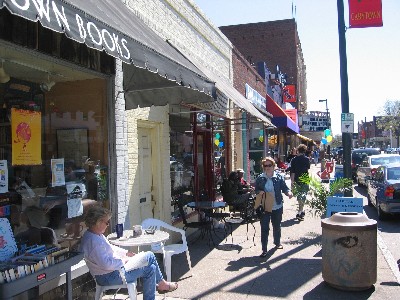 The Byrd Theater in Carytown is visible in the background of this photo of the thriving Cary Street Commercial District in Richmond. Photo by Steve Pinkus.
The Byrd Theater in Carytown is visible in the background of this photo of the thriving Cary Street Commercial District in Richmond. Photo by Steve Pinkus.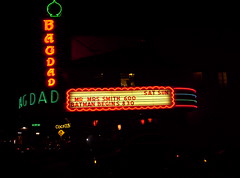 The Baghdad Theater, owned by the McMenamin Brothers, anchors the SE Hawthorne Avenue Commercial District in Portland, Oregon. This commercial district is primarily but not exclusively independent retail and among other conveniences has two Powell's bookstore branches and the great Pastaworks store.
The Baghdad Theater, owned by the McMenamin Brothers, anchors the SE Hawthorne Avenue Commercial District in Portland, Oregon. This commercial district is primarily but not exclusively independent retail and among other conveniences has two Powell's bookstore branches and the great Pastaworks store.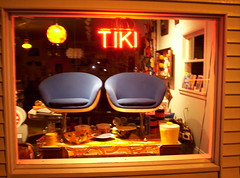 Window at Home Economics store on Hawthorne Avenue.
Window at Home Economics store on Hawthorne Avenue.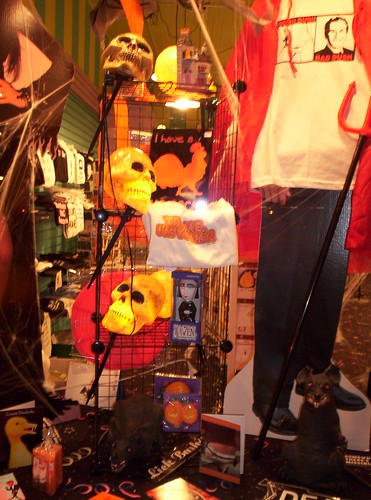 Halloween Window at Jelly Bean on SE Hawthorne Avenue.
Halloween Window at Jelly Bean on SE Hawthorne Avenue.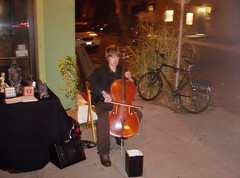 There's a lot more creativity in Portland than in Washington, DC. The Cellist, Arts on Alberta Ave., Portland, Oregon.
There's a lot more creativity in Portland than in Washington, DC. The Cellist, Arts on Alberta Ave., Portland, Oregon.One only needs to look at the revitalization of the 1300 block of H Street NE (equivalent to three city blocks in length) through the creation of the H Street Playhouse and the redevelopment of the Atlas Theater to see that there are other ways to improve neighborhoods...
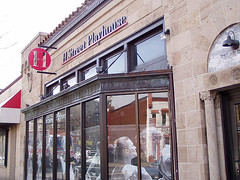 H Street photos by Elise Bernard.
H Street photos by Elise Bernard.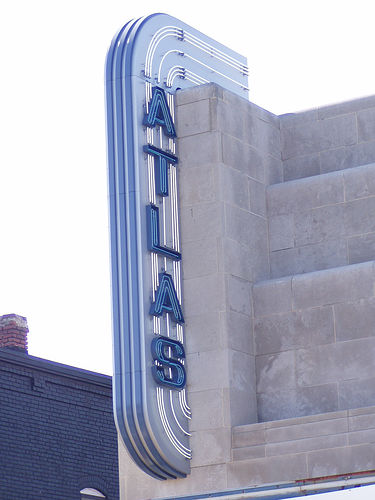
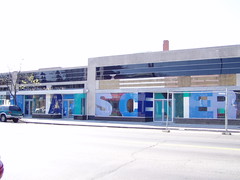



0 Comments:
Post a Comment
<< Home